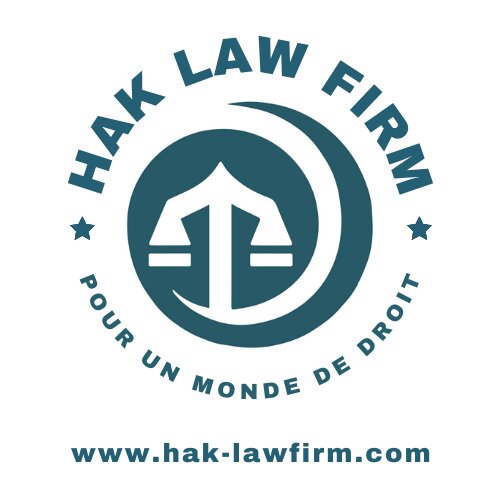Best Faith-Based Law Lawyers in DR Congo
Share your needs with us, get contacted by law firms.
Free. Takes 2 min.
Or refine your search by selecting a city:
List of the best lawyers in DR Congo
About Faith-Based Law in DR Congo
Faith-Based Law in the Democratic Republic of Congo (DR Congo) encompasses the legal aspects and implications of religious practices, religious organizations, and the intersection of religion with the state. In DR Congo, where a significant portion of the population adheres to Christianity, followed by other religions, faith-based legal issues can arise in various contexts, including marriage, education, property ownership, and organizational governance.
The legal framework regarding Faith-Based Law often involves a collaboration of customary law, statutory provisions, and international conventions. Legal practitioners in this field typically navigate both religious doctrines and state law, ensuring that the practices of faith-based organizations adhere to national legal standards while respecting religious freedoms.
Why You May Need a Lawyer
There are several situations in which individuals or organizations may require legal assistance in the field of Faith-Based Law:
- Disputes regarding marriage and divorce, particularly where religious and civil laws intersect.
- Inheritance and succession issues within families that follow religious or customary practices.
- Registration and governance of religious organizations, including compliance with state regulations.
- Challenges related to land ownership and the use of property by religious groups.
- Resolving conflicts between religious rights and the obligations imposed by civil law.
- Defending religious freedom and addressing any restrictions imposed on religious practices.
- Handling cases of discrimination or persecution based on religious beliefs.
Local Laws Overview
The legal structure in DR Congo regarding Faith-Based Law is influenced by several crucial aspects:
- The Constitution of DR Congo guarantees freedom of religion and the practice of one's faith.
- Family law in DR Congo allows religious marriage ceremonies, but couples also need civil registration to be legally recognized.
- Customary law plays a significant role, often integrated with statutory law, affecting areas such as marriage and inheritance.
- The country has ratified international human rights conventions, which influence laws on religious freedom and discrimination.
- Laws regulating the establishment and operation of non-profit and religious organizations involve registration and compliance with state norms.
Frequently Asked Questions
What is the role of Faith-Based Law in DR Congo?
Faith-Based Law addresses the legal aspects of religious practices and organizations, ensuring they adhere to both religious doctrines and national legal frameworks.
How is religious marriage recognized legally in DR Congo?
While religious ceremonies can be conducted, legal recognition requires civil registration of the marriage.
Can religious organizations own property in DR Congo?
Yes, religious organizations can own property, but they must comply with national laws regarding registration and ownership.
What are the main challenges facing Faith-Based Law in DR Congo?
Challenges include balancing religious customs with statutory law, ensuring freedom of religion, and managing conflicts between religious and civil legal issues.
Are there any legal protections for religious freedom in DR Congo?
The Constitution of DR Congo and international conventions provide protections for religious freedom and practices.
What should I do if I face religious discrimination in DR Congo?
Seek legal advice immediately to understand your rights and explore remedies through legal channels, including human rights organizations.
Is inheritance dictated by religious law in DR Congo?
Inheritance can be influenced by religious or customary law, but it must align with national legal provisions.
Who can register a religious organization in DR Congo?
Any qualified individual or group can register a religious organization by complying with legal requirements for non-profits and religious entities.
What legal obligations do religious schools have in DR Congo?
Religious schools must follow both the educational guidelines set by the state and their religious principles, ensuring compatibility with national laws.
Where can disputes between religious and civil law be adjudicated?
These disputes are typically handled in civil courts, where judges consider both legal frameworks to reach a fair decision.
Additional Resources
For further assistance, consider reaching out to:
- The National Federation of Religious Organizations in DR Congo
- Local legal practice groups specializing in Faith-Based Law
- Human rights organizations dedicated to religious freedom
- Government ministries such as the Ministry of Justice and Human Rights
Next Steps
If you require legal assistance in Faith-Based Law, consider these steps:
- Identify the specific legal issue you are encountering and gather relevant documentation.
- Consult with a lawyer specializing in Faith-Based Law to understand your rights and obligations under DR Congo law.
- Reach out to relevant organizations or bodies that can provide support or mediation services.
- Consider alternatives like mediation or arbitration if appropriate before pursuing litigation in courts.
- Stay informed about your legal rights and developments in Faith-Based Law through continuous research and consultation.
Lawzana helps you find the best lawyers and law firms in DR Congo through a curated and pre-screened list of qualified legal professionals. Our platform offers rankings and detailed profiles of attorneys and law firms, allowing you to compare based on practice areas, including Faith-Based Law, experience, and client feedback.
Each profile includes a description of the firm's areas of practice, client reviews, team members and partners, year of establishment, spoken languages, office locations, contact information, social media presence, and any published articles or resources. Most firms on our platform speak English and are experienced in both local and international legal matters.
Get a quote from top-rated law firms in DR Congo — quickly, securely, and without unnecessary hassle.
Disclaimer:
The information provided on this page is for general informational purposes only and does not constitute legal advice. While we strive to ensure the accuracy and relevance of the content, legal information may change over time, and interpretations of the law can vary. You should always consult with a qualified legal professional for advice specific to your situation.
We disclaim all liability for actions taken or not taken based on the content of this page. If you believe any information is incorrect or outdated, please contact us, and we will review and update it where appropriate.
Browse faith-based law law firms by city in DR Congo
Refine your search by selecting a city.












